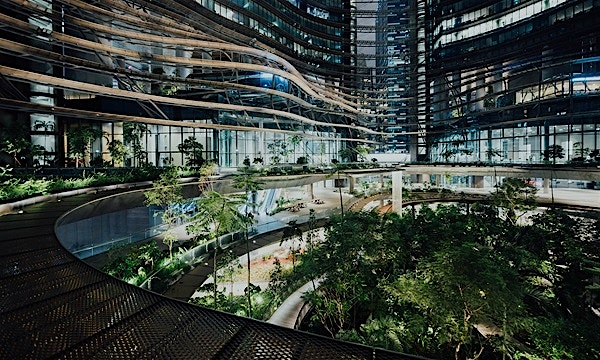Sustainability has long evolved beyond superficial corporate policies or mere compliance checkboxes. Today, it’s about people and building a future-ready organization that cares for its people while doing right for the planet and business. At HCLTech, this ethos has found deep roots, not just in boardroom strategies but in the lived experience of over 220,000 employees.
The company has embedded environmental, social and governance (ESG) principles at the heart of its operations, treating them not as separate commitments but as levers for transformation, growth and meaningful impact.
In a recent HCLTech Trends and Insights interview, Vipul Arora, Global Head of Sustainability at HCLTech, shares his thoughts on how the organization is embedding sustainability into the employee journey, from hybrid work and healthcare to long-term investments in underserved regions.
A long-term bet on employee wellbeing
Vipul Arora believes sustainability must be redefined through a people-first lens. “Sustainability has, unfortunately, become an esoteric word. It’s thrown around a lot, but that doesn’t help the cause. Sustainability simply means: can something last long-term without surprises, without risks? And for the world to be sustainable, companies must be sustainable, and for companies to be sustainable, people must be at the center,” he says.
At HCLTech, sustainability starts with the employee experience. The company’s long-term thinking is evident in its geographic expansion strategy. By establishing New Vistas in tier-2 and tier-3 cities like Lucknow, Nagpur and Madurai across India, well ahead of its peers, HCLTech has enabled talent to work closer to home, reducing the pressure on overloaded urban centers.
“People don’t need to relocate; they can enjoy a good quality of life in these towns. The campuses are world-class, with amazing facilities. We are thinking long term, which is a hallmark of sustainability,” he explains.
A bold investment in health
Perhaps one of the most pioneering moves has been HCLTech’s investment in healthcare through HCL Healthcare. Launched 11 years ago, the initiative now spans 110 locations, including 60 HCLTech sites and supports around 180,000 employees in India.
“It's a massive investment. Industry first,” says Arora. “We have more than 1,000 doctors, clinical technicians and support staff providing everything from primary care and ongoing monitoring to physiotherapy and mental health support. It's not just about reacting to a crisis but improving the quality and lifespan of employees’ lives through preventive care.”
This holistic view of wellness, physical, mental and financial, extends to upskilling, cross-skilling, coaching and more. “It’s about trust, access and foresight. even before a crisis hits, we’re ready,” he says. This initiative showcases sustainability in action, not just in environmental terms, but in how the organization protects and empowers its people.
HCLTech has mapped initiatives across the employee lifecycle, guided by feedback loops through surveys and forums.
The complexity of scale and the courage to lead
Of course, embedding sustainability into a global workforce is not without its challenges. “The first big challenge is the complexity enforced by scale and geographical dispersion,” notes Arora.
Policies need to be relevant to different life stages, age groups, gender and more. And when you're doing something for the first time, there are no benchmarks.
Still, that’s what defines leadership. “It’s an experimental approach. But that's what a leader has to face. We’ve been bold and we continue to learn and improve,” he adds.
He explains how people are the backbone of both value creation and sustainability. “We are a people business. Technology, AI and systems amplify our work, but they don’t replace the intelligence that guides them. People intelligence defines the problems AI will solve. That’s why ensuring our employees are operating at their highest potential is a business necessity,” says Arora.
From ensuring seamless, supportive employee experiences to building systems that foster creativity, Arora believes productivity can’t be measured by hours alone. “One hour of deep, creative work might solve what hundreds of hours of repetitive effort can’t. That’s why it’s critical to build the right environment where innovation, comfort and capability can flourish,” he adds.
The results speak for themselves. HCLTech’s internal value portal has contributed over $1.7 billion in client value and led to nearly 100 patents. “This is people intelligence at work — real, sustainable impact,” he says.
Making sustainability a business imperative
Arora rejects the idea that businesses must choose between profitability and responsibility. “It’s not charity. Sustainability is about long-term survival. If companies aren’t sustainable, the world cannot be sustainable.”
He shares a startling perspective: Of the top 200 revenue earners in the world, 150 are companies, not countries. “This means companies consume a large share of the world’s natural and economic resources. So, their responsibility isn’t optional. It’s structural,” he says.
He adds, “For too long, we’ve treated nature’s resources as free. The air we breathe seems free until pollution forces us to use purifiers. The moment you begin calculating the real cost of that ‘free’ air, you realize the Industrial Revolution externalized too many costs. It’s time to internalize them.”
Arora also points to climate change and resource depletion as consequences of this unsustainable trajectory. “When civilization started, the Earth had around six trillion trees. We’ve cut that to three trillion. At the same time, we’re emitting more carbon and choking the environment. If we keep this up, we might not have a liveable planet in 20–30 years,” he says.
Sustainability trends and AI
AI is a double-edged sword, according to Arora. “Every new technology begins by consuming massive resources. It’s about speed, scale, compute, throwing more GPUs and power at the problem. We’ve seen this before. The internal combustion engine didn’t start with fuel efficiency in mind. That came much later,” he explains.
But he believes we don’t have the luxury to wait this time. “With AI, we must embed sustainability into the design phase. That’s what we’re doing at HCLTech with our Responsible AI initiative. It’s about ensuring AI systems are resource-efficient, inclusive, ethical and aligned with long-term goals,” he adds.
He sees tremendous promise in using AI for sustainable outcomes, such as optimizing energy consumption, improving healthcare access or predicting environmental risks. But the foundation must be intentional. “Technology must serve humanity, not the other way around,” he says.
Looking ahead: Systems thinking, responsible leadership
As Arora puts it, the goal is to run clean, ethical and trusted businesses. That means forging meaningful relationships with employees, clients, suppliers, and society at large. “Resources may seem invisible or free today, but their misuse has long-term consequences.”
Responsibility isn’t just moral, it’s existential. And that responsibility needs to be proactive.
“Sustainability isn’t something we pivot to when there’s a crisis. If you wait for a crisis, it’s too late,” adds Arora.
From HCLTech’s early investment in healthcare to its forward-looking Responsible AI initiative, Arora believes the company is on the right path. “We’re not just ticking boxes; we’re building a future. And I’m proud to be part of an organization that sees sustainability not as a trend, but as a core business value.”






